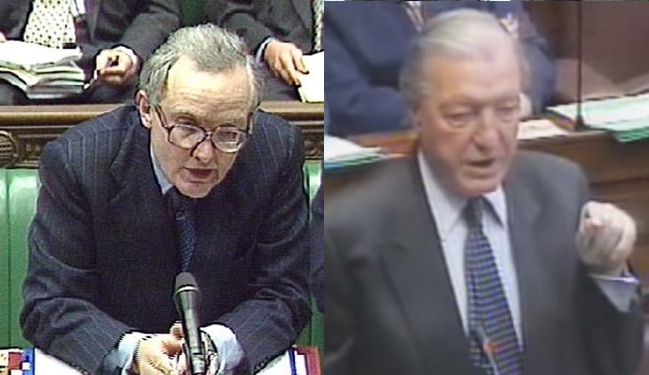
Revelations around a British government minister’s claim that some lawyers in the north of Ireland were “unduly sympathetic to the IRA” have further highlighted the need for a full public inquiry into the murder of Pat Finucane.
Irish government documents released under the 30-year rule show that Fianna Fáil’s Charles Haughey (right) raised concerns about the comments made by Douglas Hogg (left) in the House of Commons in 1989. Hogg indicated he had been prompted to make the statement by British security figures, but claimed that he had resisted ‘naming names’.
The documents noted fears in Dublin over rumours of an impending assassination of a lawyer in the Six Counties.
Senior Irish officials had raised concerns for months that high-profile defence lawyers were being targeted. They were concerned in particular for Paddy McGrory, a lawyer who had represented the families of the three IRA Volunteers killed in Gibraltar the previous year. Prominent Belfast defence lawyers Pat Finucane and Oliver Kelly were also named.
Three weeks after Hogg’s comments, Pat Finucane was shot 14 times by a loyalist death squad acting in collusion with MI5. He was killed at his north Belfast home and in front of his wife and children.
In a meeting of an Anglo-Irish conference only four days before Finucane’s murder, Tánaiste Brian Lenihan was briefed to repeat his concern about Hogg’s remarks in Westminster the previous month.
On the morning following the murder, Haughey instructed Dublin’s ambassador to Britain to convey his grave concerns about the killing to British Prime Minister Margaret Thatcher and British Direct Ruler Tom King.
The government pointed to its warning about the statements made by Hogg as well as the rumours about targeting. “The murder of Mr Finucane has shown that these concerns were justified,” said the briefing.
Haughey urged an early statement from the British government making it clear that any attack on any member of the legal profession in the North because of professional actions was an attack on the system of justice. He also said that the “greatest care [had] to be given to any statements which might have tragic consequences”.
The Taoiseach ignored British objections to the latter sentence when making a public statement later that day. However, Hogg never withdrew or retracted his remark, despite a widespread view that it had created the context for the murder.
John Finucane, the son the murdered lawyer who was this month elected Sinn Féin MP for North Belfast, said: “The details which have emerged show the importance of the need for a full inquiry into my father’s murder.
“It confirms what we knew and reinforces the need for this to be examined thoroughly.”
In February this year, the Supreme Court ruled that there had not to date been an “Article 2 compliant inquiry” into the 1989 murder, a reference to the right to life under the European Convention on Human Rights.
Relatives have long campaigned for a full inquiry into collusion in the killing.
Mr Finucane said: “We have Britain’s highest court confirming that the British government has failed to act appropriately, and this only adds to the urgency in which this matter should be dealt with.”
![[Irish Republican News]](https://republican-news.org/graphics/title_gifs/rn.gif)
![[Irish Republican News]](https://republican-news.org/graphics/title_gifs/harp.gif)

